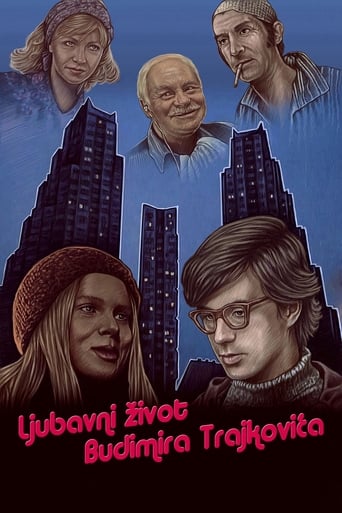Kako Je U Kraju
One of the most famous Yugoslavian movie with a great story which is making us to ignore not such a great acting. Story is about young Budimir Trajkovic, who is moving with the family quite often. His father is the bridge constructor. Budimir is the only son of his parents, so mother is trying to make him go away from any trouble. Dad is a nice and average man. Grandpa is another member of their family, really funny guy.. Classical old man. Anyway, all of them are affecting on Budimir on some ways, so he is still far away from being an independent man. He's still a peaceful kid who's got an ambition to change the things. He moves to Belgrade and starts the new life there. More and more becoming different, till the end. I won't describe more details, just watch the movie. This isn't just a regular film, it is describing the situation of quite a lot of families and kids. About parents which are ''choking'' their kid and trying to make him be an average person like they are. But this young individual is one of the rare kids which didn't allow them to, and at the end we've got a bump - he's making his first decisions as a grown man. So, at the end it's an interesting and funny movie with a few strong lessons behind it.P.S. As I said, acting isn't really on the WORLD CLASS level, just an average classic for the Yugoslavian movies of that time. However, story is great, idea is great and you've gotta see this movie!
fedor8
It's rare to come across a YU/Serbian movie that gets it right in most departments. The first requirement for a successful comedy is already fulfilled with the good casting. Dravic and Samardzic are as good a couple as one could ever hope for in a Balkan comedy. She is cute, charismatic, funny, and vivacious (much like Goldie Hawn, only better) and Samardzic is his usual likable, goofy, good-natured self.Atypically, the script is at the level of the very good cast. This is rarely the case with YU/Serbian films in which the norm is that the cast is much better than the bad or average material, which results in actors trying to eke out a few drops of quality out of inferior scripts. There are none of those useless "filler" scenes that are so typical of this region. Instead, this time the script is tight, i.e. time isn't wasted/padded on irrelevant nonsense.The flawed premise is the movie's continual (minor) problem: the moving. The fact that the ENTIRE family has to move every time Samardzic gets a new bridge-building assignment makes no sense. The solution to their "problem" is simple: Samardzic should travel to his new place of work alone and then come back to his family when he finishes the project. Obvious, huh? That's how 100 million couples live. And yet, this totally sensible – and very obvious – option is treated as if it doesn't even exist. Never once is it even mentioned. Of course it isn't, otherwise the movie's entire premise would crumble like a house of cards.The only other flaw is Budimir's "suave" friend. He is rather absurd for a 17 year-old, a typically filmic, entirely fictional character. He is inexplicably DUBBED by an adult actor (the voice provided by Dravic's real-life husband, Dragan Nikolic) which makes him sound unnatural hence a little irritating. The kid playing him is bland, apathetic and a bad actor (yes, yet another nepotist); he looks severely bored. I am also mystified as to why he'd refer to Neda Arneric as "fat".The movie rarely falls into typical Balkan cinematic traps – such as the psychiatrist-evaluation scene in which the doctor inexplicably tests Budimir in front of his entire family, and then even more inexplicably kicks him out of his office.



